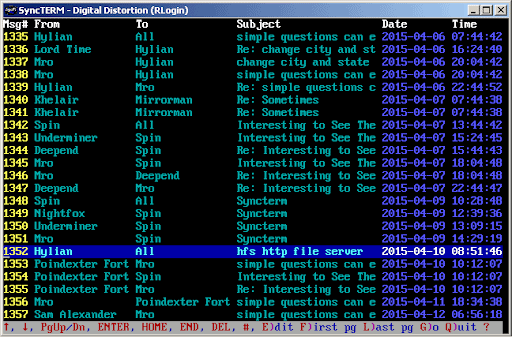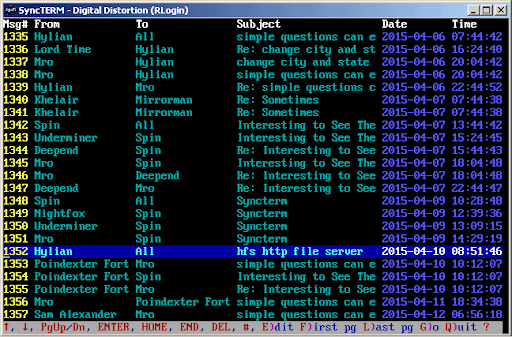Internet forums are a way of life for many of us. We turn to them for information, education, camaraderie, entertainment and friendship. They provide us a place where we can discuss mutual interests among like-minded enthusiasts. We look forward to visiting them daily, where we read fresh newly-created discussion threads, follow up on replies to posts we have made, and perhaps reach out individually to a fellow member or two that we have ongoing conversations with. We like to help others, just as we appreciate members helping us. Some forums are even graced by the presence of an industry member or celebrity.
Forums, also called discussion boards, have been around for a long time. Forums have their roots in a few early group communication systems, which still exist today. The Listserv (and similar) mailing lists are discussions participated in by e-mail, where list members mail their thoughts and replies to the list, where they are distributed for all list members to read. Usenet newsgroups are another means of group discussion, more closely resembling the forums we are familiar with.
Also, in the days of dial-up connections and text-based interfaces, you could dial into a BBS (bulletin board system), where you could not only download files but also take part in online conversations through their discussion groups. (The popular retailer Madisound Speaker Components hosted such discussions on their BBS.) In addition, you could find forums on the major online services that existed before the Internet became popular – CompuServe, GEnie, Prodigy and the younger upstart America Online (AOL) were the major players.
 A screen shot in a terminal emulator of a message listing on an old BBS.
A screen shot in a terminal emulator of a message listing on an old BBS.
As the Internet became more popular, many of us signed up for dial-up accounts at ISPs – Internet Service Providers – where we could use the Internet without having to watch the clock like we had to with the online services, where they billed according to the time you spent on them. It wasn’t long before the online services began to lose subscribers, and more users flocked to the Internet. Businesses adopted the Internet as a means of marketing their products and services and to keep in touch with their customers. Other organizations offered a presence as well, and individuals went to great lengths to offer their unique knowledge and skills to create their own sites on the World Wide Web, some establishing Web-based forums and inviting others to participate.
 A DOS dial-up screen shot.
A DOS dial-up screen shot.Along with the good came the bad. Spammers found it cheap and easy to mass e-mail Internet users by buying or hacking mailing lists or using trickery to obtain e-mail addresses. The dark web offered up all sorts of illicit and illegal diversions. The dark underbelly of Internet users would visit forums and guestbooks to stir up trouble and/or spew hateful messages, hiding behind their anonymity. And even if some users weren’t specifically out for flaming or harassing others, it did not take much to trigger negative responses in group discussions from a few of these individuals, who would make the group a miserable experience for all involved until that individual was blocked or chased away.
This is where my story begins. Having operated or moderated forums for over 25 years, I’ve experienced it all – the good and the bad, the many changes to forums and their users over time, and the continually changing tide of the Internet.
My history with online communities goes back to my time as a CompuServe subscriber. CompuServe hosted forums for various topics, everything from computer software and hardware support to all kinds of leisure interests. I first discovered a forum when I needed support for Novell Netware – I was troubleshooting a networking issue at our office, where I was the systems administrator. Once I realized there were other forums on CompuServe and saw that many of them were not based on technological topics, I set out to find a few that covered my interests.

I was a member of a handful of forums, including a Consumer Electronics forum (which split into separate audio and video forums due to volume). I was also a member of the Music/Arts Forum, where my increased activities (including writing music reviews) led to being offered a position as a “sysop,” their term for a forum moderator. The “wizops” had even higher privileges, closer to what forum administrators are today.
With users moving to the Internet and leaving CompuServe, I found I wanted a niche forum to discuss specific subjects without being tied to an online service. In 1997, a friend and I chipped in together for a hosting account to build Web sites for clients, and a few months later I registered my first couple of domain names and set up a forum. A few more forums soon followed, as I took on clients and suggested they engage with their fans or customers.
As I mentioned earlier, Usenet newsgroups were popular places for discussions. There were many more subjects, and back in those days you could trust a fellow Usenet user enough to purchase something from them. (I was a fan of rec.audio.marketplace and rec.music.marketplace.) Usenet newsgroups were offered in two different varieties – moderated, and unmoderated. Back then, the unmoderated forums were looser in structure and allowed content and behavior that moderated groups would not tolerate. It did not take long for the unmoderated groups to be filled with a lot of mischief and hate. And spam. Lots of spam. The moderated groups soon followed suit, as their moderators abandoned them. Usenet soon became a footnote in the history of group discussion, a target for spam, flaming and trolling.
Usenet demonstrated two glaring flaws – discussion groups needed moderation, and a means to register members prior to use (a vetting process). In the early days of the forums I ran, our experience mirrored the moderated Usenet groups – we had very few problems early on, but it would soon begin changing. From 1997 to 1999, problems were few and far between. But as we approached 2001, problems began to increase as the trolls and spammers ventured out from Usenet. We fortunately had few trolls, but spammers were an increasing annoyance.
Our first forum software, WebBBS (which was based on wwwboard, a modified version of which the Audio Asylum forums use to this day), had no way to prevent unregistered visitors from posting. We needed a forum with registration. After I tried a few different forum systems with our staff, we settled on an open source system called phpBB and converted our forums in early 2002. Some users complained, but they understood why it was necessary.
As with WebBBS, things ran smoothly on phpBB for a few years. I also converted other sites to the same system. But by 2006, spam really began to be a problem across all of them. It got to the point where anytime we’d add a feature to thwart spammers, they would find another loophole within two or three months and we’d be back on the hunt for the next fix. A couple of forums I ran fell into disrepair and staff was frustrated by having to delete literally dozens of new spammer signups per day, and the dozen or more spam messages they had posted. (And I should point out that these were low-traffic forums.)
As a side note, spam activity was ferocious due to scripts written to automatically register, confirm the welcome email, log in and post messages. The most popular spamming script is XRumer, still available and attacking forums and blog comments. Since common forum systems were rarely modified from stock and often improperly configured, XRumer could visit thousands of forums within an hour and successfully post spam.

I became associated with a much larger forum in late 2002 that ran vBulletin which, at the time, was one of the better licensed packages out there. By 2003, I joined the staff. When our prior administrator parted ways in 2004, I took over the administration and server tech duties. This is when the real fun began!
Working on the server component was a challenge, as we went through a lot of growing pains in terms of vBulletin’s newer versions eating more server resources (which resulted in custom modifications to reduce the loads). It was not written with the performance of high-traffic forums in mind. We went through a handful of server upgrades and an entire list of tweaks, which would only last a few months until we would hit a brick wall in our server performance.
Even more challenging was the moderating. What I had on my smaller forums was a trickle compared to this. At any time we would have one or two, all the way up to eight or more, moderators online at any given moment, and I still remember times when an issue might take a pair of us working non-stop a couple of hours to resolve, going back and forth trying to calm the situation down (soothing members’ nerves, cleaning up troublesome posts, dealing warnings or punishments, and discussing all of this before we acted).
Keep in mind that the moderators on most forums on the Internet are volunteers. We all get paid the same wage, we have no retirement plan, and the executive washroom is still off-limits.
After a handful of years in moderation, I shifted my focus primarily to server administration, while continuing to offer advice on some of the thorny member situations and filling in when the moderators needed a hand. Being an administrator not only involves keeping the server running and all of the software properly updated, it involves a lot of the “big picture” planning such as future software upgrades, changes to rules and policies, modifications to the structure of the forums (adding, deleting or merging forums as needed), and discovering more ways to set permissions for usergroups and users that benefit both the members and the staff. And yes, putting out fires is still a part of the job description. Only the fires are now of the magnitude of, “Server’s down, can’t access the forum.” At 3:23am. On a work night.
Forum software has improved over the past couple of decades. I was an early user of XenForo back in 2011, which was developed by a duo of lead developers who left Jelsoft, the owner of vBulletin. After looking at other systems out there, XenForo was the only one that really improved on vBulletin and could offer better moderation tools for our busy forums, and more helpful features for our visitors. As XenForo has evolved over the past decade, their tools for moderating a busy membership and reducing spam and trolling to almost nothing has been a welcome timesaver, relieving us from some of the stress and tedious work of managing a busy membership.

Unless someone has been on the backend of popular forums as an administrator or moderator, most are unaware of everything that goes on behind the scenes. I have outlined some of these challenges above. In this series, I will hopefully capture the essence of what it’s like to be a moderator, air a few of our frustrations and stories from the front lines, and offer our readers some helpful advice for participating in forums. Many who volunteer to moderate or administer forums are the unsung heroes who keep things running smoothly, and this is our story.
As part of the series, I would like to field questions from our readers. We will pick the most interesting of them and provide you with helpful answers in a later installment.



